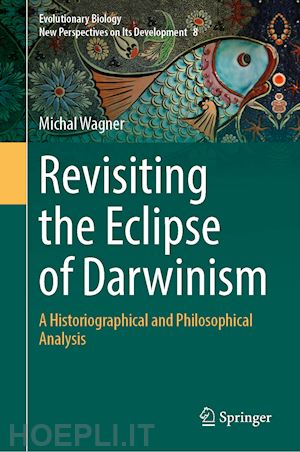

Questo prodotto usufruisce delle SPEDIZIONI GRATIS
selezionando l'opzione Corriere Veloce in fase di ordine.
Pagabile anche con Carta della cultura giovani e del merito, 18App Bonus Cultura e Carta del Docente
This book focuses on a critical reexamination of two prominent categories used in modern historiography of biology – “the eclipse of Darwinism” and the “modern synthesis”. The main objective is to critically analyze the main existing interpretations of the “eclipse of Darwinism” and emergence of the “modern synthesis”, with particular emphasis on the philosophical assumptions adopted in these interpretations. Thus, interpretations by Ernst Mayr, Peter Bowler, Mark Largent and modern historians who challenge these perspectives are discussed and critically evaluated
The analysis of the above interpretations makes it possible to determine how the philosophy of science limits the interpretation of the history of a given field, and also serves as a starting point for proposing an original interpretation of the above period in the history of evolutionary biology. The ultimate goal will therefore be a proposal of a new interpretative perspective to answer following questions: Why did the “eclipse of the Darwinism” occur? How should its origins to be understood? Why did it end (and why did the “modern synthesis” emerge)?
Main thesis of this book is that the “eclipse” was a direct response to inconsistent ontology upon which Darwin built his theory of evolution. Darwin referred to terms and concepts rooted in the philosophy of essentialism, which was problematic, because he tried to apply these essentialist concepts to his vision of the ever-changing nature. Therefore, all of the anti-Darwinian theories characteristic to the “eclipse of Darwinism” and later to the “modern synthesis” were produced in an attempt to reconcile essentialism with evolution and thus to correct Darwin's philosophical “error.”
The book will appeal to biologists, philosophers and historians alike.
Chapter 1: Introduction.- Chapter 2: History of Biology from the Perspective of the “Eclipse of Darwinism”.- Chapter 3: Main Interpretations of the “Eclipse” of Darwinism.- Chapter 4: A Critical Evaluation of Existing Interpretations of the “Eclipse of Darwinism”.- Chapter 5: New Interpretation of the “Eclipse” of Darwinism.- Chapter 6: Conclusions.
Michal Wagner is a faculty member at Cardinal Stefan Wyszynski University in Warsaw. His background is in the philosophy of nature, as well philosophy and history of science. His principal interests lie in the reception of Darwinism in the 19th century, non-Darwinian theories of evolution, as well problem of development of science.











Il sito utilizza cookie ed altri strumenti di tracciamento che raccolgono informazioni dal dispositivo dell’utente. Oltre ai cookie tecnici ed analitici aggregati, strettamente necessari per il funzionamento di questo sito web, previo consenso dell’utente possono essere installati cookie di profilazione e marketing e cookie dei social media. Cliccando su “Accetto tutti i cookie” saranno attivate tutte le categorie di cookie. Per accettare solo deterninate categorie di cookie, cliccare invece su “Impostazioni cookie”. Chiudendo il banner o continuando a navigare saranno installati solo cookie tecnici. Per maggiori dettagli, consultare la Cookie Policy.